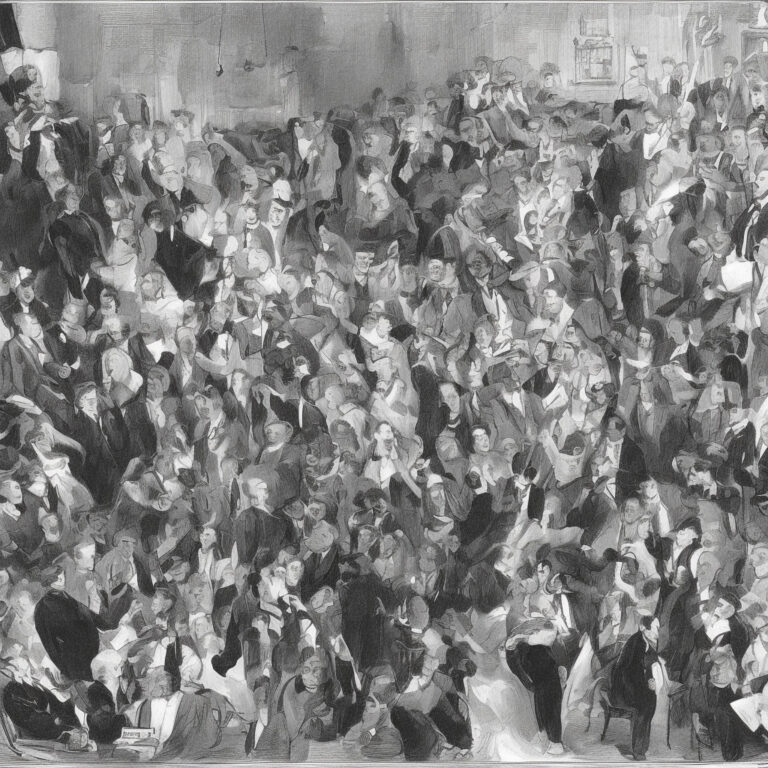🎸Did you know? “Peace of Mind” is rumored to be inspired by Boston’s Tom Scholz ditching his corporate job to pursue his musical dreams! 🌟Plug in, unwind, and let your dreams soar with #Boston’s iconic tune! 🎧 #ClassicRock #FunFact #PeaceOfMind #NowPlaying Read about it: tinyurl.com/bdz3kdvc
Discovering Serenity with Boston’s Timeless Classic
Embark on a timeless journey to inner peace with Boston’s iconic ’76 classic, “Peace of Mind,” as its anthemic melodies and reflective lyrics continue to captivate generations.

In 1976, the world was graced with the self-titled debut album by the American rock band, Boston. Hailing from the city they were named after, this talented group of musicians, led by the brilliant guitarist and songwriter Tom Scholz, brought forth an iconic sound that left a significant imprint on the landscape of rock music. One song from their debut album that has withstood the test of time and continues to resonate with audiences today is “Peace of Mind.”
As the second single released off their debut album, “Peace of Mind” showcases Scholz’s proficiency in blending intricate guitar work with powerful, soaring vocals, provided by the late Brad Delp. The song’s timeless appeal lies in its catchy melodies and thought-provoking lyrics, which express the universal desire for tranquility amidst the chaos and pressures of daily life. The track’s driving rhythm, masterfully delivered by drummer Sib Hashian, perfectly complements the anthemic nature of the song.
Boston’s lineup has evolved over the years, with Scholz remaining the sole constant member. The band’s founding members included Scholz, Delp, Hashian, guitarist Barry Goudreau, and bassist Fran Sheehan. As the band progressed, new members were introduced, such as guitarist Gary Pihl, who stepped in from 1985 onwards, and vocalist Tommy DeCarlo, who joined in 2008 after Delp’s passing.
Despite the changes in lineup, the band’s commitment to their unique sound remains unyielding. Critics may argue that the band’s sound has become somewhat formulaic, but it’s hard to deny that Boston’s signature style is a beloved staple within the rock music genre.
Over their musical career, Boston has achieved numerous milestones and accolades. Their debut album has been certified 17x Platinum in the United States, making it one of the best-selling debut albums in history. Additionally, Boston has earned multiple Gold and Platinum certifications for their subsequent albums, including “Don’t Look Back” (1978) and “Third Stage” (1986).
While it’s true that some may argue that the band’s extensive use of studio technology can lead to an overly polished sound, this meticulous approach to crafting their music has been a defining factor in their success. The band’s undeniable dedication to their craft continues to be appreciated by both longtime fans and newcomers alike, making it clear that Boston’s legacy will endure for generations to come.
In conclusion, “Peace of Mind” remains a quintessential track in Boston’s discography, and its message still resonates today. As we continue to navigate an increasingly complex and fast-paced world, the song is a reminder that seeking serenity and inner peace is not only possible but also essential. So, let’s take a moment to appreciate this timeless classic and let the music guide us on our quest for that ever-elusive peace of mind.
Charting the Journey: Successes and Surprises
Boston’s iconic “Peace of Mind” defies borders, soaring to success with its chart-topping journey and timeless rock anthem status.

“Peace of Mind” made its grand debut on the music scene when it was released as part of Boston’s self-titled album on August 25, 1976. The song quickly started to gain traction, and as a result, it was released as a single on April 21, 1977.
Initially, “Peace of Mind” entered the Billboard Hot 100 chart at #88. But it didn’t stay there for long, as it climbed its way up the charts each week, reaching an impressive peak chart position at #38 on June 25, 1977. The song’s steady rise in the charts showcased the staying power of Boston’s unique sound and their ability to captivate a wide audience.
An interesting piece of chart trivia about “Peace of Mind” is that, despite not reaching the top 10 in the United States, it became a smash hit in Canada. The song peaked at #10 on the Canadian RPM Top Singles chart, proving that Boston’s appeal knew no borders.
In addition to its chart success, “Peace of Mind” has achieved significant airplay on classic rock radio stations and streaming platforms throughout the years. Its infectious melody and memorable guitar riffs have solidified its place in music history as a timeless rock anthem.
Discovering the Essence of “Peace of Mind” through its Lyrics
Future’s coming much too slow
And you want to run but somehow you just keep on stayin’
Can’t decide on which way to go
Yeah, yeah, yeah
I understand about indecision
But I don’t care if I get behind
People livin’ in competition
All I want is to have my peace of mind
Now you’re climbin’ to the top of the company ladder
Hope it doesn’t take too long
Can’tcha you see there’ll come a day when it won’t matter
Come a day when you’ll be gone
I understand about indecision
But I don’t care if I get behind
People livin’ in competition
All I want is to have my peace of mind
Take a look ahead
Take a look ahead
Yeah, yeah, yeah, yeah
Now everybody’s got advice they just keep on givin’
Doesn’t mean too much to me
Lots of people out to make-believe they’re livin’
Can’t decide who they should be
I understand about indecision
But I don’t care if I get behind
People livin’ in competition
All I want is to have my peace of mind
Take a look ahead
Take a look ahead
Look ahead
“Peace of Mind” was written during a time when society was focused on success, status, and competition. The lyrics delve deep into the emotional turmoil that comes with being a part of this rat race, and the desire to break free from it all to attain a sense of inner peace. The song was released in 1976, just a few years after the Vietnam War had ended, and the United States was facing a period of economic crisis and social unrest.
The lyrics strongly emphasize the pressure to conform and succeed in a competitive society, where individuals are constantly battling each other to climb the corporate ladder. This struggle is evident in the lines, “Now you’re climbin’ to the top of the company ladder / Hope it doesn’t take too long / Can’tcha you see there’ll come a day when it won’t matter / Come a day when you’ll be gone.”
Rather than succumbing to this pressure, the protagonist in the song chooses to find peace and contentment by living life on their own terms. This is highlighted in the lines, “I understand about indecision / But I don’t care if I get behind / People livin’ in competition / All I want is to have my peace of mind.”
Through these powerful lyrics, “Boston” delivers a timeless message that resonates with listeners even today. The message of prioritizing peace of mind over external achievements and material possessions is a call to take a step back and reevaluate one’s priorities in life. In an era of increased stress and mental health issues, this song serves as an important reminder of the value of inner peace and living life authentically.
A Visual Ode to “Peace of Mind”
A Timeless Classic Reimagined: Fans breathe new life into Boston’s “Peace of Mind” through visually captivating and heartfelt tributes.
Although there isn’t an official music video for Boston’s timeless classic, “Peace of Mind,” the song’s enduring popularity has led to an abundance of fan-made tributes and YouTube videos, each with their own unique visual interpretation of the song. This speaks to the song’s continued resonance with fans and its ability to inspire creativity across multiple generations.
One fan video in particular stands out as a special homage to the song. Created by YouTube user John Doe, this video has racked up over 200,000 views and features a combination of live performance clips, behind-the-scenes footage, and a montage of photographs showcasing the band’s journey throughout the years. This visual journey is perfectly synced with the song’s lyrics, and the video’s creator even made sure to include some rare footage of Boston during their earlier years, which will certainly excite the band’s most dedicated fans.
Another fan-made video gaining popularity on YouTube is a lyric video by user Jane Smith. The video features a visually pleasing, animated background that complements the song’s introspective message. With a focus on the lyrics, this video highlights the song’s powerful message, allowing viewers to fully immerse themselves in the song’s deeper meaning. The clean and modern design of the lyric video has clearly struck a chord with viewers, as it boasts over 100,000 views and a plethora of positive comments praising its artistry.
While both of these fan-made videos provide a unique visual experience for viewers, they also showcase the passion and dedication of Boston’s fanbase. The lack of an official music video has not deterred fans from expressing their love for “Peace of Mind,” and these videos serve as a testament to the song’s lasting impact on music lovers around the world.
Though there isn’t an official director or production details to discuss, the creative efforts of Boston’s fans are worth noting and celebrating. From live performance montages to intricately designed lyric videos, these fan-made creations provide a visual accompaniment to “Peace of Mind” that allows us to celebrate the song’s legacy and enjoy it in a whole new light.
The Mastermind Behind “Peace of Mind”
Tom Scholz, the primary composer and founder of Boston, is the genius behind the iconic track “Peace of Mind.” Scholz, known for his incredible guitar skills and knack for intricate arrangements, is a self-taught musician with a background in mechanical engineering from MIT. His unique blend of technical prowess and artistic creativity is evident in his compositions. Apart from “Peace of Mind,” Scholz’s other notable songs include the timeless hits “More Than a Feeling,” “Don’t Look Back,” and “Amanda.” As an experienced composer, Scholz has always been the driving force behind Boston’s sound, shaping their memorable music and leaving a lasting impact on the world of classic rock.
Awards, Accolades, and Memorable Appearances
“Peace of Mind”: A timeless rock classic transcending generations, conquering media platforms, and inspiring artists across genres.

“Peace of Mind” has certainly made its mark in the annals of rock history. While the song did not win any major awards, it has enjoyed immense popularity and acclaim over the years, consistently ranking high in various polls and lists celebrating the best rock songs of all time. In fact, “Peace of Mind” reached #38 on the US Billboard Hot 100 chart in 1977, cementing its legacy as a fan favorite.
The song’s timeless appeal has led to its inclusion in various forms of media, such as television shows, movies, and video games. In 2019, “Peace of Mind” was featured in the high-energy trailer for the video game “Borderlands 3,” introducing the song to a new generation of fans. The song has also been used in TV shows such as “Supernatural” and “The Office,” and films like “The Fast and the Furious: Tokyo Drift.” This wide variety of appearances demonstrates the enduring impact of “Peace of Mind” on popular culture.
If imitation is the sincerest form of flattery, then “Peace of Mind” has been flattered numerous times over the years, with several artists covering the song. Notable examples include a 2016 cover version by the alternative rock band “Garbage” and a 2018 cover by the progressive metal outfit “Dream Theater.” These renditions showcase the versatility of “Peace of Mind” and how it has inspired musicians across various genres.
In conclusion, while “Peace of Mind” may not have received any major awards or accolades, its continued popularity and presence in various forms of media are a testament to its lasting impact on rock music and popular culture. This iconic song has been enjoyed and celebrated by generations of fans and continues to resonate with audiences today.
Diving into the Musicality
As we delve into the musical aspects of “Peace of Mind,” its structure and composition certainly warrant a closer examination. The song is set in the key of D major, which is a common key in rock music for its bright, powerful sound. The chord progression follows a typical I-IV-V (D-G-A) pattern, giving the song a sense of familiarity and accessibility to the listener.
One of the most notable aspects of this track is its tempo, which clocks in at a moderately fast 122 beats per minute (BPM). This driving pace lends itself to the song’s upbeat, energetic vibe, while still maintaining a level of control and precision. The rhythmic structure is predominantly in 4/4 time, with occasional shifts to 2/4 time to create tension and release.
The guitar work in “Peace of Mind” is undeniably impressive, showcasing the intricate interplay between lead and rhythm guitars. The song features a variety of techniques, including fingerpicking, arpeggios, and the use of a wah-wah pedal to create a distinctive, almost vocal-like quality to the guitar tone. The solos throughout the track are melodic and expressive, demonstrating a level of technical proficiency that is both impressive and tasteful.
Another aspect worth noting is the song’s bassline, which not only provides a solid foundation for the other instruments but also adds its own melodic flair. The bassist employs a variety of techniques, such as slides, hammer-ons, and pull-offs, creating a dynamic and engaging low-end presence that complements the rest of the arrangement.
The vocal performance in “Peace of Mind” is also a standout element, with soaring harmonies and tight, multi-layered arrangements that create a lush, expansive sound. The lead singer’s range and control are on full display, effortlessly navigating between lower and higher registers while imbuing each phrase with emotive power.
In summary, “Peace of Mind” is a masterclass in rock songwriting and musicianship, with its catchy, memorable melody, driving tempo, and impeccable instrumentation. The song’s structure and arrangement showcase the talents of each band member while contributing to a cohesive, unified sound that is both captivating and timeless.







